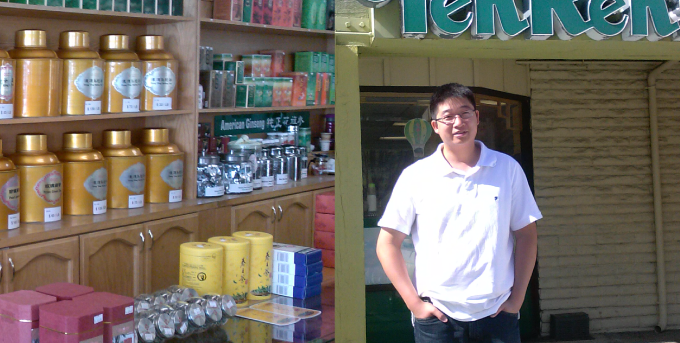The Taiwanese corporation Ten Ren reigns over the global tea industry. Henry Lii owns two Ten Ren franchises in Northern California, one in Cupertino, one in Richmond. Ten Ren tea runs in
Henry’s blood – his uncle founded the company and his parents owned the two stores before him. With Ten Ren’s reputation for quality tea and the growing popularity of the sweet tea-based
refreshment called pearl milk tea (also known as bubble or boba tea), Henry’s stores have prospered. He took some time to share with Nav on his journey of business ownership.
The Start
How did you get started with your business?
I used to be an engineer at CISCO, but I knew I would eventually step in to help my parents at Ten Ren. They own the Ten Ren stores of Northern California. They had given franchise rights to the original owner of the Cupertino and Richmond locations, but the Ten Ren headquarters decided they didn’t want a franchise branch to create more franchises, so my parents asked me to take over both stores in 2002.
How did you fund your business in the beginning?
The store was funded by Ten Ren investors in Taiwan and a lot of my family. Funding generally isn’t a problem; a lot of people will invest if they hear a new Ten Ren is opening. Ten Ren stores do well generally and we don’t have much competition, especially in the US. There aren’t many traditional tea stores here and we always open in Asian populated areas, like this one in Cupertino Village.
Running the Business
How did you learn to run the business?
I transitioned my engineering skills into business. It helped that I knew how to make Excel spreadsheets and how to think logically about the business. I kept track of the numbers and learned some basic bookkeeping.
As for the drinks, I tweaked some of our pearl milk tea recipes. The menus across the stores aren’t required to be the same; we just need to carry a certain percentage of Ten Ren products, so there’s room for creativity. The main thing I had to learn was the loose-leaf tea side, so I visited some of the tea farms in Taiwan.
Who was your first customer?
Well, the store had been open for about seven years before I took over, and most of the old customers kept coming.
What’s the smartest thing you did in the first year?
The Food Handler’s certification wasn’t required before, but I took a food safety class anyways. I noticed some violations at our store and I corrected them.
What’s the biggest mistake you made in the first year?
(It wasn’t really a mistake but) I put more emphasis into the drinks side than the tea side. Most of the employees aren’t as comfortable selling tea as they are making drinks. Business on the tea side has been stable (but didn’t grow much.) It’s just that boba has been getting really popular in the last five years. It really shot up in the last three years.
What’s the most challenging thing about running your own business?
They say engineers have to be smart and work hard. Well, business people have it hard, too, just in a different way. As an engineer in a big company there was more structure; there was a department for everything. Here at Ten Ren I’m on call all the time. Someone might call me at 3 A.M. to say they’re sick and I’ll have to scramble to cover their shift. That’s the big difference – I have way less free time as a store manager. And that’s hard when you’re also building a family.
What’s the most rewarding thing about running your own business?
Compared to being an engineer, I like the variation of work here. It’s been an exciting past two years. I really enjoy seeing the business grow and I’m thinking of opening more stores.
What I’ve Learned
What advice would you give others starting in this business?
The competition is steep. Boba places are basically the same – most people use the same syrups and flavor ingredients. What really sets us apart is the quality of the tea. Ten Ren does well because we have good tea. We also have a traditional Chinese and Taiwanese niche, but
in the long run we’ll need to break out of it and adapt.
About the Author — Sarah Tang is a recent graduate of UC Berkeley where she learned to love the diverse personalities of mom-and-pop stores. She likes intriguing storefronts, creative specialty stores, and well-designed business websites.
This article was originally written on January 7, 2015 and updated on July 21, 2016.


Have at it! We'd love to hear from you and encourage a lively discussion among our users. Please help us keep our site clean and protect yourself. Refrain from posting overtly promotional content, and avoid disclosing personal information such as bank account or phone numbers.
Reviews Disclosure: The responses below are not provided or commissioned by the credit card, financing and service companies that appear on this site. Responses have not been reviewed, approved or otherwise endorsed by the credit card, financing and service companies and it is not their responsibility to ensure all posts and/or questions are answered.